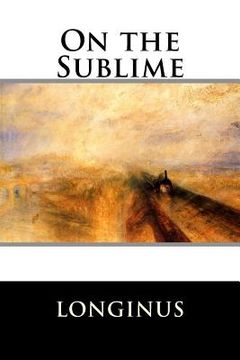Reseña del libro "On the Sublime (en Inglés)"
On the Sublime is one of a number of classical literary treatises that pose the often-considered problem of nature versus art, of the relative contributions of natural genius or inspiration and of acquired skill to great writing. The author of On the Sublime, who almost certainly was not Longinus, but instead was an anonymous Greek rhetorician of the first century, argues throughout the work that it is a writer's genius that lifts the reader out of himself (or herself), above the limitations of reason. The author also points out that it takes great skill, training, and self-discipline to know when to give free rein to one's genius and when to hold it in check. This treatise is an interesting combination of philosophical speculation about the elevating, moving powers of poetry and oratory and of practical suggestions about the grammatical constructions and figures of speech that contribute to the effectiveness of great or sublime writing. The author, an enthusiastic critic of his literary predecessors, often quotes Homer, Demosthenes, the great Greek dramatists, and even the book of Genesis to illustrate the powers of literature, and he points out faults with examples from the works of less skilled writers and from inferior passages in the works of the masters. The author begins On the Sublime with a definition of the sublime in literature as a "loftiness and excellence in language" that uplifts the reader and makes him or her react as the writer desires. Sublimity may arise from a few words that cast light on a whole subject, or it may be the result of the expansion and development of an idea; the treatise suggests that the former method is generally the more powerful. The great danger for the writer who seeks to create a sublime passage is the possibility of lapsing into bombast, that what is intended to be majestic will be simply an empty show. Other potential traps are affectation in expression and empty emotionalism, the display of passion that is not sufficiently motivated. The search for novelty, which on occasion can create a striking effect, may also result in inappropriate imagery and diction. The elements of the truly sublime in literature are often hard to distinguish; they are known chiefly by their effect-the reader's sense of exaltation. Too, a great passage will grow in meaning and significance with each rereading. Five sources of the sublime are outlined. Two of these are results of the natural capacities of the author: grandeur of thought and the vivid portrayal of the passions. The other three are basically rhetorical skills: the appropriate use of figures of speech, suitable diction and metaphors, and the majestic composition or structure of the whole work. An important source is the first, which rests upon the sweep of the author's mind. Although a great intellect is likely innate, it may be enlarged by association with great ideas. Reading the finest works of the past and pondering them is always valuable, although even the greatest minds can sometimes fall below their customary level. The author suggests that Homer's Odyssey (c. 800 b.c.e.) is on a lower plane of intensity throughout than his Iliad (c. 800 b.c.e.). It is the work of an aging man who dreams, but "he dreams as Zeus might dream." One of the tormented love...

